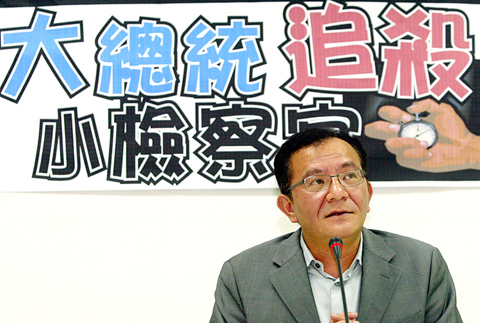President Ma Ying-jeou (馬英九) has filed an appeal at the Taipei District Court after prosecutors decided not to indict Hou Kuan-jen (侯寬仁), a prosecutor on the Special Investigation Panel (SIP) of the Supreme Prosecutors Office, for forgery.
Taipei District Court spokesperson Huang Chun-ming (黃俊明) said yesterday the court received a letter of committal for trial in March from Ma’s attorney, but the court has yet to announce its ruling.
Hou was one of the prosecutors investigating Ma’s handling of his special allowance funds when he was Taipei mayor, minister of justice, vice chairman of the Mainland Affairs Council and other posts.

PHOTO: LIN CHENG-KUNG, TAIPEI TIMES
Ma sued Hou for forgery in January last year, alleging that Hou had inaccurately documented his questioning of Wu Li-ju (吳麗洳), a Taipei City Government treasurer, about Ma’s use of his mayoral special allowance.
Last year Ma asked the court to remove three prosecutors from his cases for “bias.”
State Public Prosecutor-General Chen Tsung-ming (陳聰明) rejected the request.
At a meeting last year with the Arbitration Association of the Republic of China, Ma made a reference to his own legal woes by saying that more attention should be paid to accurately documenting questioning sessions.
Although Ma has dropped several of the lawsuits he filed during the presidential campaign last year, he did not drop the charges against the prosecutors who investigated him for graft.
Attorney Billy Chen (陳達成) said Ma’s appeal was a way of “killing a chicken to scare the monkeys,” a Chinese idiom meaning to make a big show of punishing one person to elicit fear in others.
If Ma had anything against the prosecutor, he did not have to use judicial means because he was the president and has the power to demote prosecutors, who are civil service employees, Chen said.
“If [Ma] is dissatisfied with a prosecutor, he only has to tell the premier, who can order the minister of justice to demote [or punish by other means] the prosecutor,” Chen said, but such a low-key action would not serve as a warning to other prosecutors and investigators.
Presidential Office Public Affairs Department director Tsai Chung-li (蔡仲禮) said that Ma decided to appeal not out of personal interest but to serve as an example to others because every citizen could encounter such a situation.
“It is not a small matter,” Tsai said said. “It is a matter of principle and judicial justice and an important part of the judicial reform. He will set an example.”
Special Investigative Panel spokesperson Chen Yun-nan (陳雲南) visited the Presidential Office yesterday afternoon, but Tsai said he did not meet Ma.
While Minister of Justice Wang Ching-feng (王清峰) said she respected the president’s right to appeal, Democratic Progressive Party (DPP) Legislator Gao Jyh-peng (高志鵬) was critical of Ma.
“Big president bullies small prosecutor,” Gao said, adding that Ma was narrow-minded and he could not forgive being indicted.
Gao called on Ma to respect the results of the investigation.
ADDITIONAL REPORTING BY KO SHU-LING AND RICH CHANG

AGING: As of last month, people aged 65 or older accounted for 20.06 percent of the total population and the number of couples who got married fell by 18,685 from 2024 Taiwan has surpassed South Korea as the country least willing to have children, with an annual crude birthrate of 4.62 per 1,000 people, Ministry of the Interior data showed yesterday. The nation was previously ranked the second-lowest country in terms of total fertility rate, or the average number of children a woman has in her lifetime. However, South Korea’s fertility rate began to recover from 2023, with total fertility rate rising from 0.72 and estimated to reach 0.82 to 0.85 by last year, and the crude birthrate projected at 6.7 per 1,000 people. Japan’s crude birthrate was projected to fall below six,

Conflict with Taiwan could leave China with “massive economic disruption, catastrophic military losses, significant social unrest, and devastating sanctions,” a US think tank said in a report released on Monday. The German Marshall Fund released a report titled If China Attacks Taiwan: The Consequences for China of “Minor Conflict” and “Major War” Scenarios. The report details the “massive” economic, military, social and international costs to China in the event of a minor conflict or major war with Taiwan, estimating that the Chinese People’s Liberation Army (PLA) could sustain losses of more than half of its active-duty ground forces, including 100,000 troops. Understanding Chinese

US President Donald Trump in an interview with the New York Times published on Thursday said that “it’s up to” Chinese President Xi Jinping (習近平) what China does on Taiwan, but that he would be “very unhappy” with a change in the “status quo.” “He [Xi] considers it to be a part of China, and that’s up to him what he’s going to be doing, but I’ve expressed to him that I would be very unhappy if he did that, and I don’t think he’ll do that. I hope he doesn’t do that,” Trump said. Trump made the comments in the context

SELF-DEFENSE: Tokyo has accelerated its spending goal and its defense minister said the nation needs to discuss whether it should develop nuclear-powered submarines China is ramping up objections to what it sees as Japan’s desire to acquire nuclear weapons, despite Tokyo’s longstanding renunciation of such arms, deepening another fissure in the two neighbors’ increasingly tense ties. In what appears to be a concerted effort, China’s foreign and defense ministries issued statements on Thursday condemning alleged remilitarism efforts by Tokyo. The remarks came as two of the country’s top think tanks jointly issued a 29-page report framing actions by “right-wing forces” in Japan as posing a “serious threat” to world peace. While that report did not define “right-wing forces,” the Chinese Ministry of Foreign Affairs was